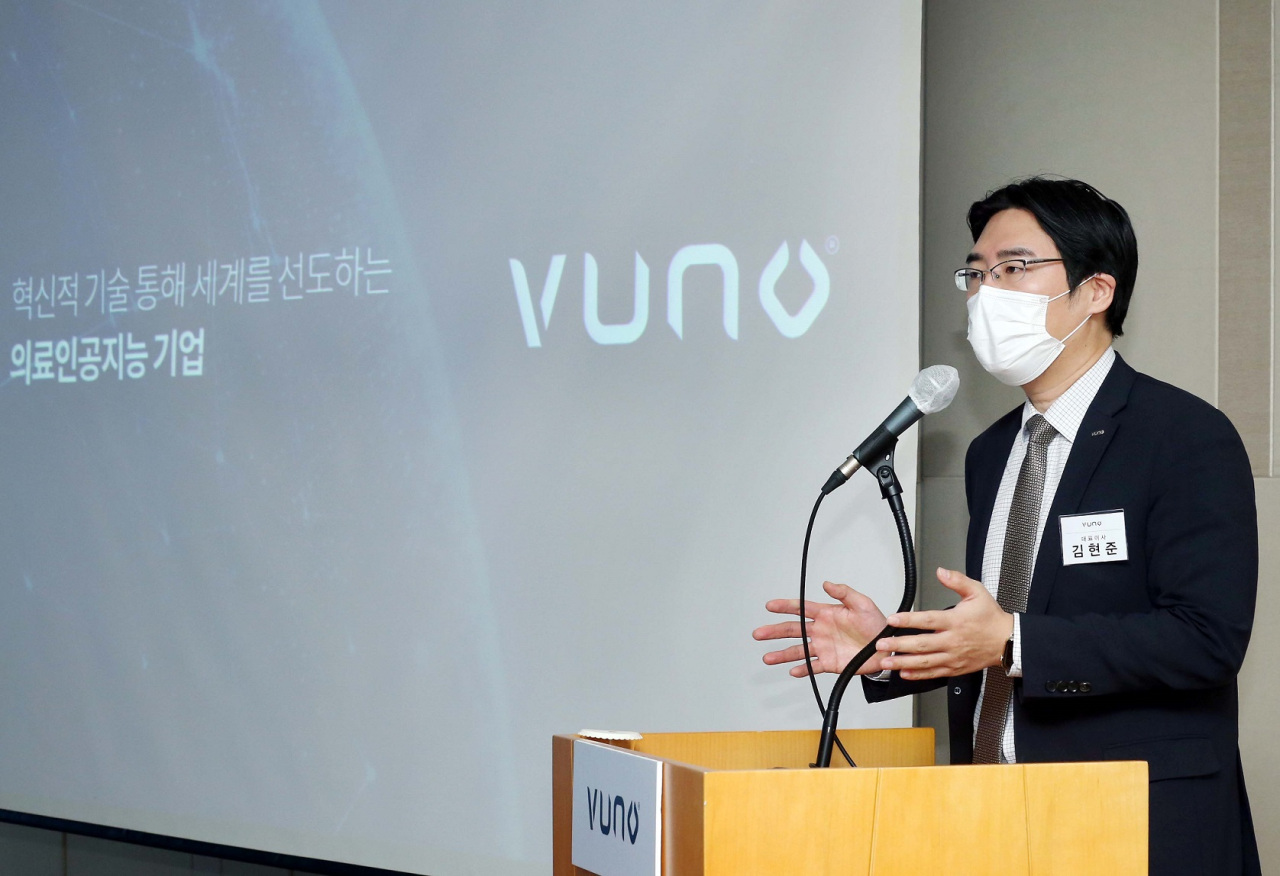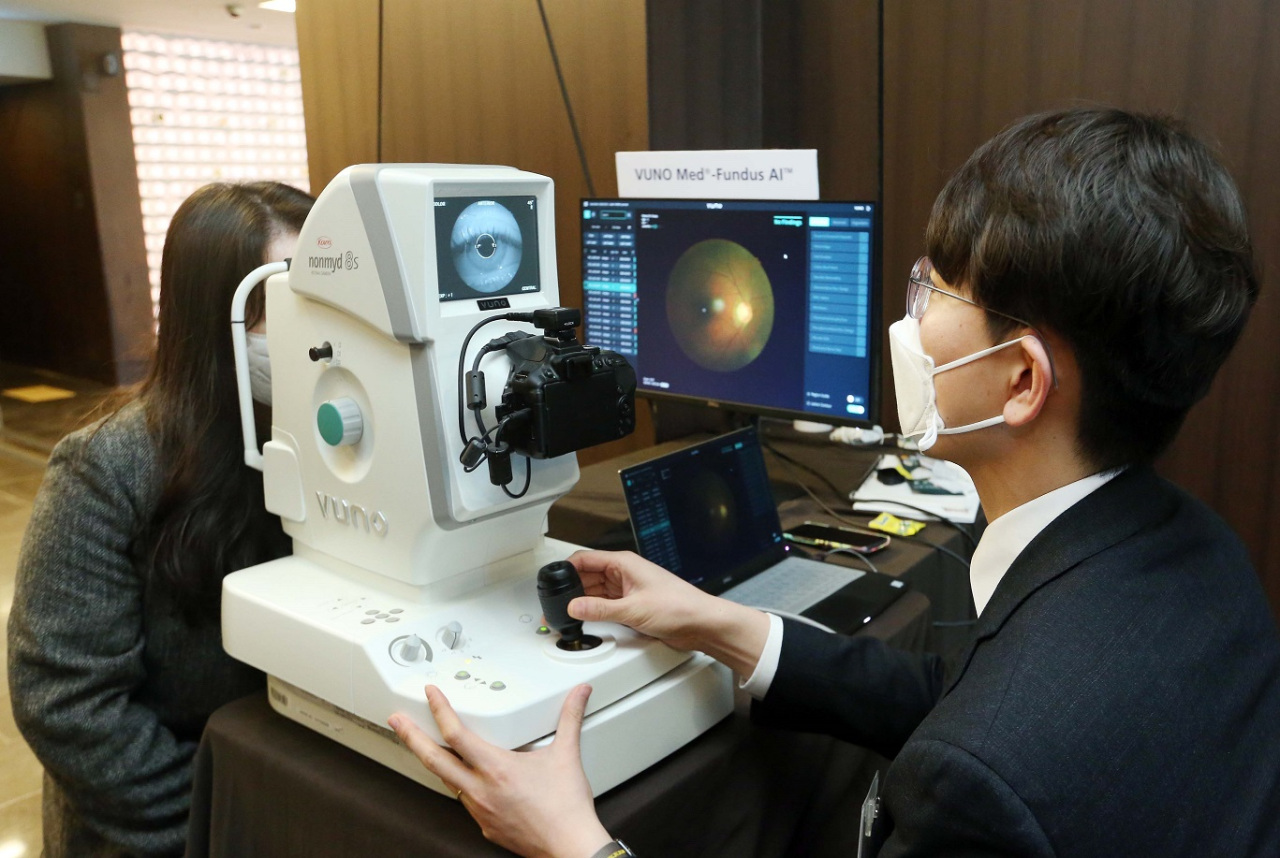
Vuno, one of South Korea’s leading medical artificial intelligence companies, will make an initial public offering Feb. 26, CEO Kim Hyun-joon said at a press event Monday.
Advance subscriptions for Vuno’s stocks will take place Feb. 16 and 17 through underwriters Mirae Asset Daewoo and Samsung Securities.
Vuno is newly issuing 1.8 million shares upon going public. At an estimated 15,000 won to 19,500 won per share, Vuno is attempting to raise as much as 35.1 billion won with the listing.
The funding would be a much-needed injection of cash into the company, which had accumulated an operating deficit of 7 billion won ($6.2 million) by the third quarter of 2020.
The projected value of the global digital health care market is around 12 trillion won by 2024, CEO Kim said. In that market, Vuno envisions seeing annual revenue of 37 billion won by 2023.
The new issuance will account for 14.3 percent of Vuno’s total shares and the total outstanding number will be more than 10.8 million. The majority shareholders will be the three co-founders, taking out 35.2 percent.
Vuno had 54 AI patents in 2018, according to the state-operated patent office’s data -- the greatest number held by any company.
The company has eight commercially available AI software programs being used at over 200 hospitals in Korea.
It has a strategic partnership with UBcare, a GC Pharma affiliate, for an AI solution that can determine the age of a person’s bones and predict how much they can grow. UBcare has the largest medical network in Korea, through which Vuno hopes to reach out to a broader pool of potential clients.
With Leaders KR, an ophthalmology medical device distributor, Vuno is channeling its Fundus AI software, which can catch early symptoms of glaucoma and other eye anomalies.
Vuno predicts that medical AI could alleviate the workload of medical professionals in this increasingly aging society.
A report from the World Health Organization titled “Global strategy on human resources for health: Workforce 2030” suggests that in nine years the world can expect to face a medical workforce shortage of 15.6 million people.
Vuno’s AI can remedy that shortage by providing fast, accurate assistance in four areas, CEO Kim said -- medical imaging, pathology, vital signs and electronic medical records.
Advance subscriptions for Vuno’s stocks will take place Feb. 16 and 17 through underwriters Mirae Asset Daewoo and Samsung Securities.
Vuno is newly issuing 1.8 million shares upon going public. At an estimated 15,000 won to 19,500 won per share, Vuno is attempting to raise as much as 35.1 billion won with the listing.
The funding would be a much-needed injection of cash into the company, which had accumulated an operating deficit of 7 billion won ($6.2 million) by the third quarter of 2020.
The projected value of the global digital health care market is around 12 trillion won by 2024, CEO Kim said. In that market, Vuno envisions seeing annual revenue of 37 billion won by 2023.
The new issuance will account for 14.3 percent of Vuno’s total shares and the total outstanding number will be more than 10.8 million. The majority shareholders will be the three co-founders, taking out 35.2 percent.
Vuno had 54 AI patents in 2018, according to the state-operated patent office’s data -- the greatest number held by any company.
The company has eight commercially available AI software programs being used at over 200 hospitals in Korea.
It has a strategic partnership with UBcare, a GC Pharma affiliate, for an AI solution that can determine the age of a person’s bones and predict how much they can grow. UBcare has the largest medical network in Korea, through which Vuno hopes to reach out to a broader pool of potential clients.
With Leaders KR, an ophthalmology medical device distributor, Vuno is channeling its Fundus AI software, which can catch early symptoms of glaucoma and other eye anomalies.
Vuno predicts that medical AI could alleviate the workload of medical professionals in this increasingly aging society.
A report from the World Health Organization titled “Global strategy on human resources for health: Workforce 2030” suggests that in nine years the world can expect to face a medical workforce shortage of 15.6 million people.
Vuno’s AI can remedy that shortage by providing fast, accurate assistance in four areas, CEO Kim said -- medical imaging, pathology, vital signs and electronic medical records.

In clinical trials, Vuno’s AI software could detect anomalies in the lung scans of 269 out of 10,000 patients in whom human doctors could find no problems.
Of the 269, it was found that 10 had relatively serious problems that could have developed into lung cancer.
Kim said in every test, Vuno’s AI solutions could improve the accuracy of medical imagery readings by 8 percent.
Vuno’s commercially available AI solutions at the time of the IPO are VUNO Med-Deep ASR, VUNO Med-DeepBrain, VUNO Med-BoneAge, VUNO Med-Chest X-ray, VUNO Med-LungCT AI, VUNO Med-Fundus AI, PROMISE-I and VUNO Med-DeepBrainAD.
Other software from the company is in clinical trials in ahead of commercialization: VUNO Med-Dental AI, VUNO Med-Path GC AI and VUNO Med-DeepCARS.
For global markets, Vuno has formed strategic alliances with Japanese company Sony’s medical information subsidiary M3 and with Taiwan’s biggest medical service provider, CHC Healthcare Group.
Within the first half of 2021, Vuno will establish a US branch, although the location has not been finalized, Kim said.
Vuno was established in December 2014 by Lee Ye-ha, Kim Hyun-joon and Jung Kyu-hwan. The trio met as AI researchers at the Samsung Advanced Institute of Technology. The company’s name stands for “View the invisible, know the unknown.”
Meanwhile, Lunit, another homegrown medical AI company in Korea that was founded by researchers from the Korea Advanced Institute of Science, is set to go public in October.
By Lim Jeong-yeo (kaylalim@heraldcorp.com)


















![[Today’s K-pop] Treasure to publish magazine for debut anniversary](http://res.heraldm.com/phpwas/restmb_idxmake.php?idx=642&simg=/content/image/2024/07/26/20240726050551_0.jpg&u=)